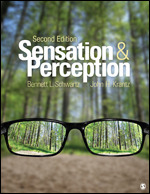|
Interactive Sensory Laboratory Exercises (ISLE) 2.0 is a complementary set of activities, experiments, and
illustrations that allow students to engage the concepts of Sensation & Perception, 2nd ed. by interacting with
the phenomena discussed in the book, including anatomical diagrams, visual illusions, auditory illusions,
and musical selections. Hands-On Experience In working through these exercises, students have the opportunity to interact and see how different variables alter their experience. For example, students can: • Try out Kuffler's experiment exploring center-surround receptive fields and other models of cells in the brain, with results generated in real time. • See what a photograph looks like to people with different forms of dichromacy, and upload their own photographs to see what happens.
• Read about hue cancellation and then run an experiment that allows them to manipulate the stimulus and
method settings.
Anaglyph glasses Some of the photographic figures on ISLE are anaglyphic stereograms, and they will require special glasses to be seen properly. See chapter 7 for more information about stereograms. These glasses are now provided with the book. But if you lots them or need more, they are easy to make, or, if you prefer, cheap to buy, individually or in bulk. Please note that you will need Red/Cyan anaglyph glasses. Consult ISLE P.1 for specific information about either making or ordering these glasses. Assessment You can see the results of these experiments and collect the data in an Excel-ready format that is compatible with any statistical analysis package. In addition, there is a full set of quiz questions to be uses to assess what students have gained from interaction with the exercises. Flexibility The site is designed to work on most platforms, devices and browsers, and is optimized for display on tablets and mobile phones. Each exercise also includes its own set of specific instructions. Acknowledgments We gratefully acknowledge John Krantz, co-author of Sensation & Perception, for creating and developing the Interactive Sensory Laboratory Exercises (ISLE) 2.0. Special thanks are also due to Hanover College for hosting this site and to Sarah Blythe of Washington & Lee University for creating the ISLE assessments. |

Pub date:
January 2018
|
|||
|
|
||||